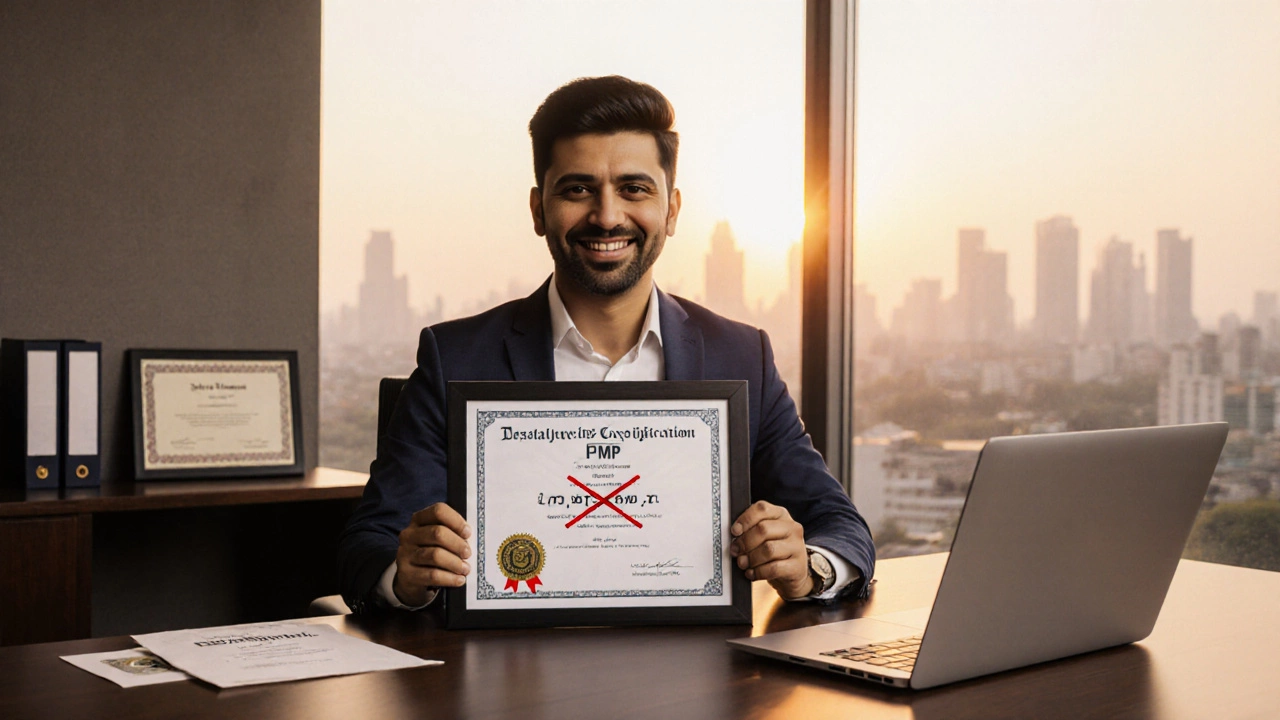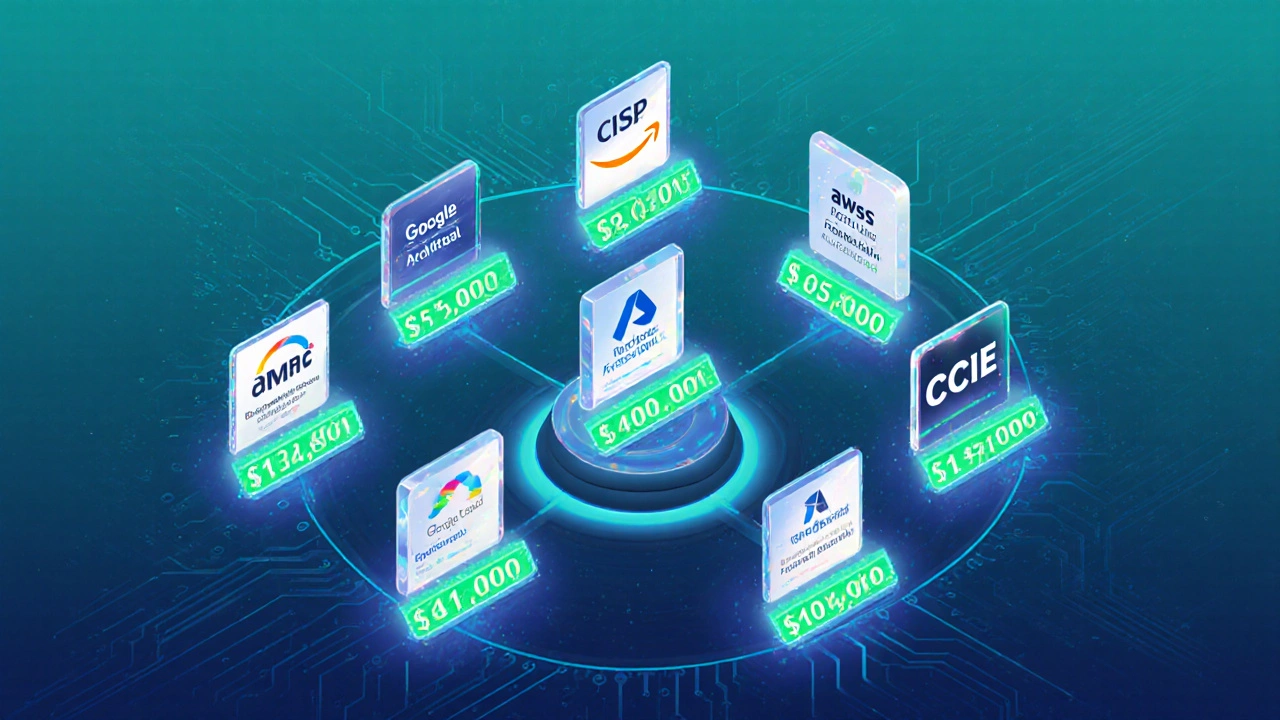
Certification ROI Calculator
Calculate Your Certification ROI
Determine if your certification investment is financially worthwhile using your current salary, certification cost, and expected salary increase.
Imagine pulling in a six‑figure salary without ever holding a traditional bachelor’s degree. The secret? A targeted professional certification that tells employers you’ve mastered a high‑value skill set.
High‑paying professional certifications are credential programs that focus on specific industry skills, often validated by a rigorous exam and industry‑backed standards. While they don’t replace a degree, they can open doors to roles that typically command salaries well above the national average.
Why certifications can out‑earn a degree
Employers today care more about what you can do than where you learned it. Certifications give a clear, measurable proof of competence, so hiring managers can skip the guesswork. In fast‑moving fields like cloud computing, cybersecurity, and project management, the knowledge gap between a recent graduate and a certified specialist can be years wide.
Data from the 2024 Global Skills Report shows that certified professionals earn on average 20% more than peers with a comparable degree. When you pair that premium with lower tuition costs and a shorter study timeline, the ROI becomes hard to ignore.
Certification roundup: the top earners in 2025
Below are the certifications that consistently rank at the top of salary surveys, along with the roles they unlock and what you need to get started.
| Certification | Average Salary (USD) | Typical Roles | Prerequisite Experience | Exam Cost (USD) |
|---|---|---|---|---|
| Project Management Professional (PMP) | $115,000 | Project Manager, Program Director | 3+ years leading projects | $555 (member) / $805 (non‑member) |
| Certified Information Systems Security Professional (CISSP) | $130,000 | Security Analyst, Information Security Manager | 5+ years in security | $749 |
| AWS Certified Solutions Architect - Professional | $140,000 | Cloud Architect, Solutions Engineer | 2+ years designing on AWS | $300 |
| Google Cloud Professional Cloud Architect | $138,000 | Cloud Architect, GCP Engineer | 3+ years cloud design | $200 |
| Cisco Certified Internetwork Expert (CCIE) | $150,000 | Network Engineer, Senior Infrastructure Architect | 5+ years networking | $1,600 (lab) + $450 (written) |
| Microsoft Certified: Azure Solutions Architect Expert | $135,000 | Azure Architect, Cloud Consultant | 2+ years Azure design | $165 per exam (2 exams) |
| Six Sigma Black Belt | $120,000 | Process Improvement Manager, Quality Engineer | 3+ years quality work | $350 |
| CompTIA Security+ | $95,000 | Security Technician, IT Auditor | Entry‑level (no experience) | $370 |
What each certification actually delivers
- PMP: Recognized worldwide as the gold standard for project leadership. Holding PMP signals you can manage budgets over $1million, align cross‑functional teams, and keep projects on schedule.
- CISSP: Validates deep knowledge across eight security domains, from risk management to software development security. It’s the badge most senior security roles require.
- AWS Solutions Architect - Professional: Shows you can design complex, cost‑optimized architectures on Amazon’s platform, a skill that powers many Fortune500 cloud migrations.
- Google Cloud Professional Cloud Architect: Proves mastery of GCP services, data pipelines, and security best practices-essential as Google’s market share climbs.
- CCIE: The most revered networking credential. It proves you can design, implement, and troubleshoot enterprise‑grade networks at scale.
- Azure Solutions Architect Expert: Demonstrates ability to drive Azure‑centric digital transformation, a fast‑growing need as Microsoft captures more cloud market.
- Six Sigma Black Belt: Equips you to lead process‑improvement projects that cut waste and boost profit margins, a skill set prized in manufacturing and services.
- CompTIA Security+: Entry‑level but widely respected; it lays the groundwork for more advanced security paths.

Step‑by‑step guide to landing a high‑paying cert
- Identify your target role. Look at job listings on LinkedIn or Indeed, note the certifications they ask for, and match them to your interests.
- Check prerequisites. Most top‑paying certs require a mix of work experience and prior training. Note any gaps you need to fill.
- Choose study resources. Official prep courses, vendor‑run bootcamps, and reputable platforms like Coursera, Pluralsight, or Udemy offer structured material. For PMP, the PMBOK Guide is a must‑read; for cloud certs, vendor‑provided practice labs are essential.
- Create a timeline. Allocate 10‑15hours per week, set milestone dates (e.g., finish domain 1 by week 3), and schedule the exam at least two weeks before your deadline.
- Take practice exams. Simulate real test conditions; aim for 80%+ accuracy before you book the official exam.
- Register and sit the exam. Use the official testing center or approved online proctoring service. Bring a valid ID and a calm mindset.
- Maintain the credential. Most certs require continuing education credits (CPEs). Set a yearly reminder to log your hours and renew before expiration.
Cost vs. payoff analysis
While some certifications (e.g., CCIE) can cost upwards of $2,000 when you factor in lab fees, the salary boost often pays for the investment within a year. Entry‑level certs like CompTIA Security+ have low barriers and can still yield a $20,000 salary bump if you transition into a security analyst role.
Calculate your own ROI: (Average Salary Increase×Years of Expected Work)−Total Certification Cost. If the result is positive, the certification is financially worthwhile.
Common pitfalls and how to avoid them
- Skipping prerequisites: Jumping straight into a CCIE lab without the required networking foundation leads to costly retakes.
- Relying on free content only: While YouTube tutorials are great for basics, official vendor labs and practice exams are crucial for passing the real test.
- Neglecting soft skills: High salaries also come from leadership, communication, and problem‑solving abilities. Pair your cert with a chance to lead a project or mentor peers.
- Forgetting renewal: Letting a credential lapse can erase the salary premium you earned. Set calendar alerts for renewal windows.

Where to find job openings that value certifications
Major job boards allow you to filter listings by required certifications. In addition, industry‑specific sites like Dice (tech), Indeed (general), and Glassdoor often tag positions with “PMP”, “CISSP”, or “AWS”. Recruiters on LinkedIn also search for these keywords, so list your credential prominently in the headline and skills sections.
Future‑proofing your career
Tech evolves quickly, but certifications tend to be updated regularly to reflect new standards. Keeping your credential current ensures you stay relevant, and many employers provide sponsorship for recertification, further enhancing your earning power.
Frequently Asked Questions
Do I really need work experience before getting a high‑paying cert?
Most top‑paying certifications list experience as a prerequisite because they validate practical skill, not just theory. For example, CISSP demands five years of security work, while CompTIA Security+ accepts beginners. If you lack experience, start with entry‑level certs, gain on‑the‑job exposure, then move up.
Can a certification replace a college degree when applying for senior roles?
In many tech and project‑management tracks, a respected certification can outweigh a bachelor’s degree, especially when combined with proven project outcomes or demonstrated expertise. However, some industries (e.g., medicine, law) still require formal degrees.
How long does it typically take to prepare for these certifications?
Preparation time varies. PMP candidates often spend 8‑12 weeks, AWS Professional candidates 4‑6 months, while CompTIA Security+ can be ready in 6‑8 weeks with focused study. Your background and available study hours are the biggest factors.
Are these certifications internationally recognized?
Yes. Certifications like PMP, CISSP, AWS, and CCIE are globally accepted, allowing you to work in multiple countries without re‑credentialing.
What’s the best first certification if I’m starting from scratch?
CompTIA Security+ is a solid entry point for IT, giving you foundational security knowledge and a marketable credential that can lead to junior analyst roles.
